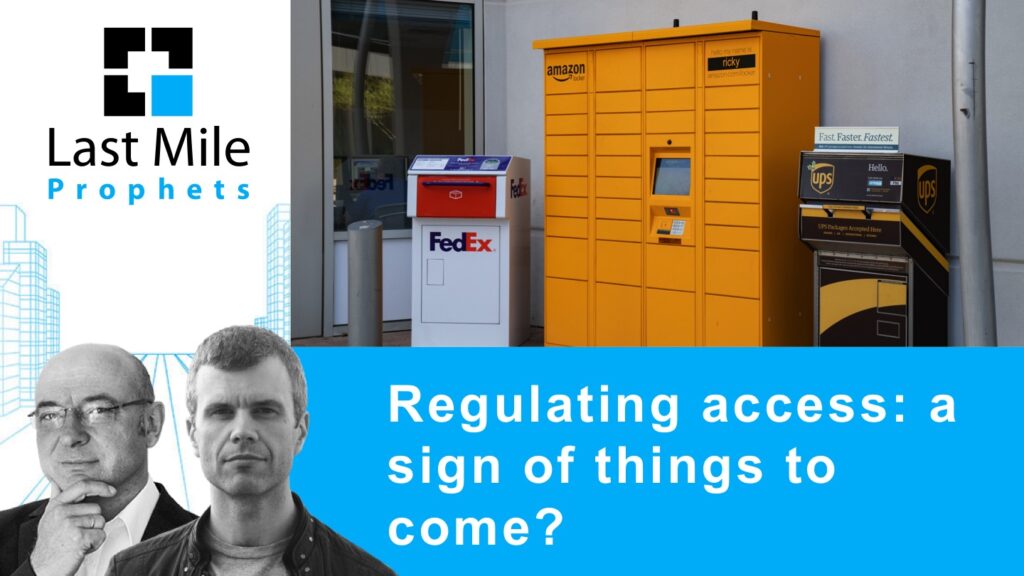As was the case in telecoms or other large public utility sectors, obtaining access to necessary infrastructure can be very difficult due to refusal or unfair conditions from their owners. A more collaborative – or regulated – approach to access is needed if we are to develop operationally, financially and environmentally friendly solutions for the growing demand for parcel delivery in the European Union. This article aims to take a look at some of the key issues in this increasingly topical area.
Background
The postal service plays a vital role in each society as an essential instrument of communication and trade. Postal legislation used to be dedicated to the duties and obligations of the state-owned postal operator. Any competition on the market was forbidden as the postal incumbent had exclusive rights to the postal service. Nevertheless, the shape of the postal service has constantly been changing. Technological developments of telecommunication and electronic communication have significantly impacted the postal service, especially e-commerce and digitalization (e-administration). The recent, increasingly dynamic development of the postal market has triggered a discussion about its EU legal framework, especially the scope of the universal postal service.
The current EU regulation, adopted on December 15, 1997, was the Postal Services Directive 97/67/EC, which established the first regulatory framework for the European postal services. Market liberalization and universal service obligation were the major components of the directive.
Most Western EU countries fully implemented the EU postal regulations before the 3rd Postal Directive was introduced and, by 2008, their postal markets had already passed a structural transformation process. However, this was not the case for Central and Eastern EU member states which share common historical and economic backgrounds and have very similar postal regulations.
The key basis for current legislation in the EU member states in the 3rd EU Postal Directive seeks to:
- ensure the right to universal service for all users;
- change how the universal postal service could be provided and financed;
- require access to certain elements of the postal infrastructure; and
- extend consumer protection provisions.
Member states must now provide adequate legal instruments for enforcement which are generally held by the postal National Regulatory Authorities (NRA) and are related to the universal service.
Latest developments
Covid-19 has had a major impact on postal markets with a significant decline in mail volumes coupled with the increasingly dynamic growth of the parcel market. E-commerce B2C and, more recently, C2C parcel volumes are the key growth areas. Simultaneously, there has been significant growth in OOH (out-of-home) delivery infrastructure (access points and parcel lockers), as has been shown by Last Mile Experts 2021 Out of Home Delivery report. This is leading to a need for change in the regulatory area, especially those parts pertaining to letters or OOH infrastructure.
Currently, only the universal service provider is required to give access to some element of the postal infrastructure to other postal operators. This is a ‘one way street’ and the universal service provider cannot expect access to other postal operators’ infrastructure.
Taking a closer look at the elements of postal infrastructure listed in EU regulations, some infrastructure elements that can be relevant to the new last mile include drop boxes or letter boxes; parcel lockers are generally still not covered.
Despite some initiatives such as those in Belgium or Norway, most posts still operate a closed infrastructure model as far as the parcel carriers are concerned. So how can carriers seek to gain access to postal infrastructure?
Access to the infrastructure can be granted on the basis of EU competition law – Article 101[1] and 102[2] of TFEU (Treaty on the Functioning of the European Union). The antitrust authority applies ex-post competition law in several steps in a complex and time-consuming process including a Hypothetical Monopolist Test[3], which determines whether one or several undertakings have sufficient market power to behave independently of competitors and ultimately consumers. Finally, the authority determines whether the undertakings with market power have committed an anti-competitive practice. And, if it is this case, the authority imposes fines and/or behavioral remedies (to put an end to the anti-competitive practice) or structural remedies if necessary and proportionate, e.g. access to the elements of infrastructure held by the undertaking.
In recent times, some of the EU national authorities have issued decisions against postal operators (generally non-public ones) for harming competition regulation. The Autorità Garante della Concorrenza e del Mercato (AGCM) – Italy’s competition authority – slapped a €1.13bn (US$1.25bn) fine on Amazon for abusing its dominant position in the market and harming competitors in the e-commerce logistics service. “Amazon holds a position of absolute dominance in the Italian market for intermediation services on marketplaces, which has allowed it to favor its own logistics service,” the Italian regulator said.
The future landscape
The key question today is ‘Where should legislation go in order to protect the public, and the environment?’. Last Mile Experts’ team believes that the upcoming Postal Service Directive (PSD) will focus much more on the courier sector due to its increasing importance to the market and the economy. One of the essential issues is access to certain elements of the postal infrastructure. Accordingly, we expect that the sector-specific regulations dedicated to the postal infrastructure will be extended. In particular, as in the telecommunications sector, access to infrastructure will increasingly be made open to all market players (operators). The term ‘open access’ is neither defined in the postal regulation nor any associated legal document. Generally, it is understood as referring to a form of wholesale access whereby operators are offered transparent and non-discriminatory access, thereby enhancing competition (and operational efficiency) at the retail level.
According to Ian Streule, global head of postal and courier practice and partner at Analysys Mason, a key consideration for the PSD review is whether the new Directive chooses to reflect similar ex-ante[4] frameworks from electronic communications which guide member states’ NRAs in undertaking market analysis. “Initially this could be the ‘three criteria test’ to identify markets susceptible to ex-ante regulation. However, even with such a test, it remains to be seen whether the country-specific situations regarding ‘necessary’ infrastructure would pass the test, and further if there is an operator which would then be considered to have SMP (significant market power).”
The degree and speed of implementation of new rules will be dependent on the continued dynamics in parcel and letter markets as well as the openness of politicians and regulators to recognize the increasingly urgent need for action. The future of the last mile and its effect on the environment and the consumer will be dependent on the decisions we take today.
[1] Article 101 prohibits anti-competitive agreements between two or more independent market operators.
[2] Article 102 prohibits abusive behaviour by companies holding a dominant position on any given market.
[3] Commission Notice on the definition of relevant market for the purposes of Community competition law, O.J. [1997] C 372/5. For an application to the electronic communication sectors, see Commission Guidelines of 9 July 2002 on market analysis and the assessment of significant market power under the Community regulatory framework for electronic communications networks and services, OJ [2002] C 165/6, para 33-69.
[4] Ex-ante in order to address the competition issue before it emerges or causes harm. This is distinct from ex-post which is applied after the event, typically in a competition law claim.

Mateusz Chołodecki is a LME Pro Partner and head of the Postal Market Laboratory at the Center for Antitrust and Regulatory Studies (CARS) Warsaw University.

Marek Różycki is managing partner at Last Mile Experts, specializing in CEP and e-commerce last-mile advisory.


